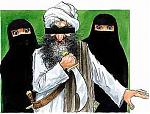Maddog,Areas that interest me the most are Afghanistan, American Revolution, American Civil War and Vietnam.
Looks like you have the answer already. The four wars can all be called civil wars, so what are the common factors and the lessons learnt: conflict resolution, SSR , conventioanl and unconventional etc. 'Fighting in civil wars: lessons from US history for Afghanistan'.
davidbfpo
PS Don't forget to add a few lines of introduction on the 'Tell Us Who You Are' thread: http://council.smallwarsjournal.com/...t=1441&page=52.










 ) who know nothing about the area, gives you two advantages:
) who know nothing about the area, gives you two advantages: .
.



Bookmarks